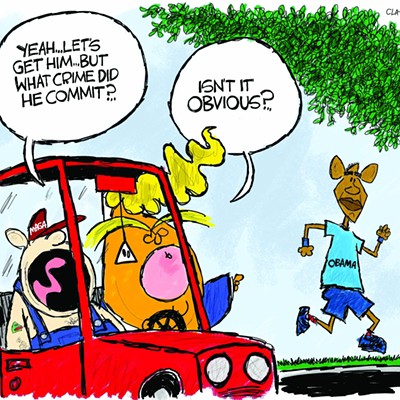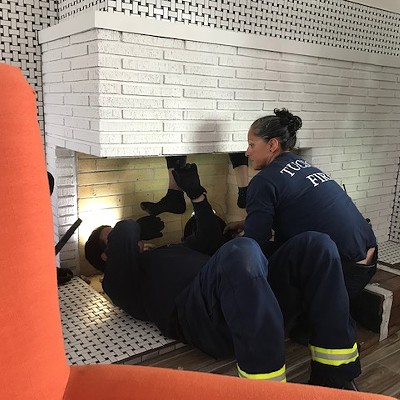Johnson didn't count on gas leaking from the Cadillac--not even his ride--at such a rate that, despite his catching the spill with a can, the fire department and four cops would be on the scene in minutes.
He couldn't have known that an off-duty cop awaiting his golf buddies at the Circle K, 5501 E. Golf Links Road, would use such a desperate tone when describing Johnson to the police who showed up that morning. Or that Johnson, initially jovial and relaxed with the officers, would turn skittish, bolt and then be beaten with metal batons, doused repeatedly with pepper spray and cuffed while gasping for breath.
Johnson was a big, tough guy. He was a star defensive end at Pueblo High School whose speed and ability to hit earned him all-city honors as a junior. Division I programs, including UCLA, watched him closely. All that crashed when he blew out his right knee during a workout before his senior season.
Eleven years after his playing days ended, Johnson was not a saint. Cocaine and opiates were in his system the day he died, but he couldn't have known that he would be arrested for giving police his brother's name, and because the car he was driving had a pipe on the front seat.
At the time Johnson was loaded--face down--onto a gurney and put in an ambulance bound for Kino Community Hospital, just five miles away, Johnson probably didn't know that he would die in nine minutes.
He was 28.
Ever since that day--Aug. 8, 1999--Johnson's family, including his daughter Ashley, and the family's lawyer, Stanton Bloom, have asked whether putting gas in a leaking tank, bolting from police and having a pipe should have added up to a death sentence.
They are pressing the matter in a civil-rights lawsuit against the city and police officers Eric Murch and Floyd Ginn, the Tucson Fire Department and Southwest Ambulance, a subsidiary of Rural Metro.
The city--through retained lawyer Daryl Audilett--and Southwest Ambulance say Johnson's death was unrelated to the pepper spray, the baton strikes or the type of care he received.
The official cause of death, according to Deputy Medical Examiner Dr. Cynthia Porterfield, was "sudden death while under the influence of cocaine and opiates complicated by agitation and restraint."
The city temporarily suspended its use of pepper spray--which greatly inhibits a person's ability to breathe--after Johnson's death and after another man became critically ill after being sprayed by police.
From testimony through the first three days of the trial that began April 6 before Judge John M. Roll in U.S. District Court, a picture has emerged that varies from those presented by police and the media in the days after Johnson's death.
Officer Murch, responding to staccato questioning from Bloom, attempted to describe a frenetic scene at the Circle K, testifying that he tried simultaneously to keep people away from the gas leak, talk to off-duty officer Ray Thompson, size up Johnson and, later, Johnson's friend Clemente Groger as well.
Bloom asked if it was standard for police to be at a scene that could seemingly be handled by the fire department, then zeroed in on what off-duty Officer Thompson told Murch about Johnson when Murch arrived at the scene.
"Did he tell you he was a bad guy?" Bloom asked? "Did he tell you that he was one of his bad guys? Did he tell you that he was a shithead?"
Murch repeatedly said he didn't specifically recall Thompson's words, but that he had taken heed to his warnings.
Johnson, on that day, was in and out of the Circle K. He was on a cell phone trying to arrange a safe tow, at Murch's suggestion. He also was in and out of the Cadillac, which belonged to a woman named Kandee. He was pleasant, according to testimony, and not upset about the annoying car trouble. He called for a friend, Groger, who drove up and was promptly arrested for having plates that belonged on another vehicle and outstanding warrants.
Murch testified that when he asked Tyrone Johnson for his name, he responded, "Timothy Johnson"--the name of Tyrone's older brother. Murch also testified that Johnson said he didn't have any identification--that he didn't have his wallet--although Murch said he could see evidence to the contrary.
Bloom hammered Murch for not simply talking to Johnson about the name and wallet. Why, Bloom repeatedly asked, didn't Murch just tell Tyrone that he knew that he wasn't Timothy Johnson?
Ginn, also under rapid-fire questioning from Bloom, said he wasted little time after arriving at the Circle K that day before finding a pipe in the Cadillac Johnson was driving.
It was described as drug paraphernalia.
Murch decided then that he would arrest Johnson. That might have meant, Murch testified, that he took him to pre-trial services at the Pima County Jail, or cited him and released him in the field.
Bloom struck on that point, underscoring the officer's testimony that paraphernalia without the drugs is essentially nothing--or at least not something to spur an arrest.
(The pipe, Ginn testified, was destroyed after the city was notified of the Johnsons' claim. It was not tested.)
Johnson bolted, running for a spot that would let him get over a wall and away from the fit Murch, who acknowledged that he pursues until he catches the person he's after.
"Even," Bloom said, "those who have committed no crime."
Murch gave chase and twice attempted to spray Johnson with pepper spray, mostly from the back, he said. He also pulled his telescoping, metal baton and struck Johnson several times. The autopsy shows a wound to Johnson's head, although Murch and Ginn insisted on the stand that they did not swing for the head.
Murch, a defensive-weapons instructor, said he swung at Johnson as he attempted to go over the wall, and later after chasing him through a residential property and a congested carport.
He continued to strike Johnson when Johnson stopped and dropped to all fours on asphalt. Murch said Johnson would not "get prone." The number of strikes, once listed at between five and eight, could actually have been as many as 11, according to testimony. Murch swung with such force that he said he could not demonstrate his motion with the baton in court because, given his sweaty hands, he feared the baton would fly out.
When Johnson would not comply with Murch's order to get flat, the officer sprayed him with pepper spray in the face.
In court, Murch said he agreed with Johnson that the asphalt was hot, and he permitted Johnson to crawl under a carport. The homeowner, Robert Hernandez, was doing roof repairs.
Johnson, court papers and Bloom say, repeatedly said he could not breathe, that he had asthma. Responding to an incredulous Bloom, Murch said that Johnson actually thanked him "for being nice" and apologized for running from him.
For the Johnson family--Timothy and Ashley, who sit with Bloom at the table, and mother Lois, who takes a seat in the shallow gallery--the testimony is a painful recitation of Tyrone's last moments.
It is a family familiar with sadness. Tyrone's young brother, Troy, was killed when he was 11 after being hit by a car while riding his bike. Tyrone's father, Frank, died before the trial began from complications from diabetes.
Bloom and the Johnson family are in a difficult battle, confined by Roll's rulings that restrict what Bloom can present and how he can present it.
That difficulty began when the city's lawyer, Audilett, won approval to have the lawsuit--filed in Pima County Superior Court in July 2000--transferred to federal court. That will require Bloom to win unanimous support from the 10-person jury that is made up of five women and five men. In Superior Court, civil verdicts can be reached with the support of six of eight jurors.
Roll also granted a city motion to strip race issues from the lawsuit. That did not stop Bloom from exposing Murch as a veteran cop who has used pepper spray only twice--each time on African-American men who were large and muscular.
Audilett complained bitterly later. With the jury out of the courtroom, Audilett told Roll that Bloom had vowed "not to play the race card."
"I didn't even have time to object," Audilett complained.
Murch said he did not chase Johnson because he was African American.
"And if you did," Bloom noted with doubt, "you would tell us about that."
Included in the jury selected in federal court are one African-American woman, two Hispanic women and one Hispanic man.












